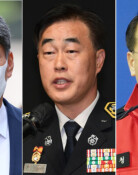U.S., Korea Split on Counterfeiting Issue
U.S., Korea Split on Counterfeiting Issue
Posted January. 28, 2006 04:08,
The U.S. and Korea differ on whether or not North Korea has actually been involved in counterfeiting, and on how to resolve the issue.
At the core of the issue is the disagreement on whether North Korea is guilty of producing and circulating forged dollars.
President Roh Moo-hyun said in his New Years address on January 25, The kinds of illicit activities North Korea has engaged in with regard to counterfeiting need to be confirmed, hinting that he has no intention of accepting the U.S.s counterfeiting claim at face value.
On the other hand, U.S. President George W. Bush said in a press conference on January 26, We have sent strong messages to North Korea not to forge U.S. currency, suggesting that the counterfeiting allegations have been proven. His remarks are in line with what the U.S. delegation from the Treasury Departments office of financial crimes, who recently visited Korea, said in reference to North Korean government-led illegal financial activities.
Roh has made his opposition to the idea of pressuring North Korea clear, saying, We need to see if there is any underlying intention behind the U.S.s campaign to pressure the North Korean regime. The president went even further, warning the U.S., Any attempt to pressure North Korea will cause friction between the U.S. and Korea, and conveying the message that he prefers a diplomatic solution through dialogue on this issue as well as the North Korean nuclear issue.
Bush dismissed the possibility of political compromise on this issue, however. He is standing by his governments policy of pressuring North Korea and imposing the financial sanctions that North Korea has cited as a reason for it not to return to the six-party talks, saying, The sanctions are designed to block the transfer of the money earned from illegal activities.
Does the South Korean government believe that the North is not involved in counterfeiting operations? Not necessarily.
A few government officials acknowledge privately that the North Korean government has been involved in the counterfeit money business, even though they are reluctant to do so publicly.
Government officials have also tried to stave off questions about the forged money issue in public press conferences by vaguely saying, We are gravely concerned about the issue.
The two countries have very different views on the issue, in large part because they are looking at the issue from different perspectives.
The U.S. sees the issue from the perspective of maintaining national security and global economic order, while South Koreas first priority is making sure the issue does not negatively impact the ongoing six-party talks and inter-Korean relations. In this regard, it is understandable that the South Korean government is anxious not to provoke North Korea.
As a result, the two countries have proposed different solutions for the same issue. The U.S. prefers a strict law-enforcement solution, while South Korea favors a political compromise.
Jong-Koo Yoon jkmas@donga.com







